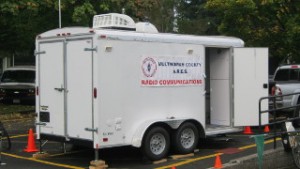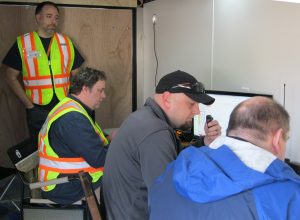The primary mission of the Multnomah County Amateur Radio Emergency Service is to ensure that qualified amateur radio operators (AROs) are ready to provide communications support to organizations – served agencies – that have requested these services in times of emergency.
Steve: Where is the OFB located?
Kiri: We are stationed at the OFB HQ on NE 33rd in PDX, a couple miles from the airport. There are additional OFB locations in Washington County, Tillamook, and Ontario with radio equipment.
Steve: How long has the OFB been a served agency of MCARES?
Kiri: I believe we fired up in late 2013. Adam KF7LJH was originally the team lead. I joined as team lead when Adam moved into his current position in mid-January 2014. Essentially 2 years.
Steve: How will your team support the OFB during an emergency?
Kiri: Provide backup communications between OFB sites, and OEM and other agencies if there is a grid-down situation, or landlines are clogged. I envision most of the traffic will be passed relating to movement of food stuffs around the state between OFB sites. OFB operates in emergency situation under the national response framework. So whatever they are mandated to do under the emergency support function we would be helping passing traffic.
Steve: Who are the OFB Team members?
Kiri: Kiri K7KAH, Chris KE7OSH, and John KF7ZWX.
Steve: How long have you been Team Leader?
Kiri: Since January, 2014.
Steve: What kinds of Ham equipment do you operate at OFB?
Kiri: Each OFB site has a portable set that was put together by Garrett AF7RF and Dean (OFB liaison).
UHF/VHF: Yaesu 8900
HF: Yaesu FT897-D
Commercial: 800 MHZ for county communications (Emergency use only)
Antennas: horizontal dipole for HF, I don’t know the brand of VHF antenna.
We have headsets, no desk mics, just the mics that come with the radios. No TNC.
Steve: Do you have Winlink/Winmor capabilities?
Kiri: Not yet.
Steve: What are some of your operating challenges?
Kiri: We are at a low point in the city, so sometimes getting to places over the hills on simplex can be a challenge. We also have challenges reaching our Ontario and Tillamook stations on HF when the propagation is bad. They are getting ready to install a massive generator at our location. We will have to see if that introduces any interference to our operations. When they test the generator out we will need to fire up the station, so that’s on the to-do list.
Steve: Has the Team done separate training apart from regular MCARES drills?
Kiri: I try to meet with Dean on a monthly basis to test the radios. We have done HF calls to Ontario a few times. Eventually we’ll want to get tests out to all the stations, if possible on a monthly basis. And get the rest of the MCARES team and OFB hams in on these meetings when possible. Our next big challenge is testing the Washington County location which has not been operated at all – hopefully some time in November.
Steve: Are there other facts or statistics that you feel may be of interest to the general MCARES membership?
Kiri: We need more people on our team, so if you are not on a team yet and you live in NE and you’re interested in food safety, movement, and volunteering with a great organization for a great organization, let us know!
 We would like to extend our gratitude to everyone who has donated both financially and with their talents to help make this project become a reality. Thanks to the craftsmanship of our members we’ve completed the flooring, walls and insulation, electrical wiring, and the cabinetry and work surfaces. And as of this writing, the AC and DC infrastructure is at 80% and getting dialed in. Lighting, ceiling, and graphics are in the near future.
We would like to extend our gratitude to everyone who has donated both financially and with their talents to help make this project become a reality. Thanks to the craftsmanship of our members we’ve completed the flooring, walls and insulation, electrical wiring, and the cabinetry and work surfaces. And as of this writing, the AC and DC infrastructure is at 80% and getting dialed in. Lighting, ceiling, and graphics are in the near future. Throughout its construction, the trailer has been constantly field tested through drills and public events including Walk MS, the Spring
Throughout its construction, the trailer has been constantly field tested through drills and public events including Walk MS, the Spring